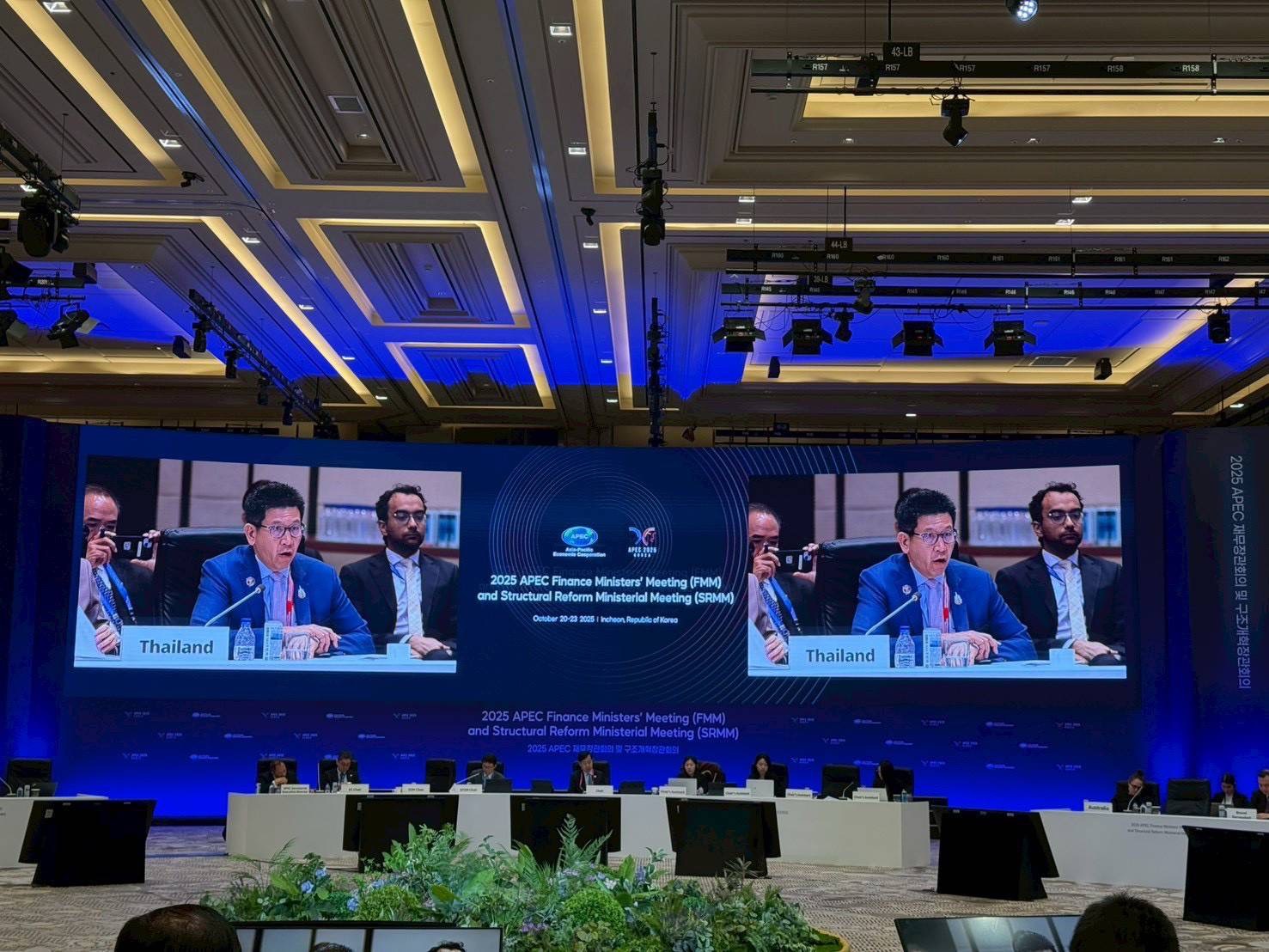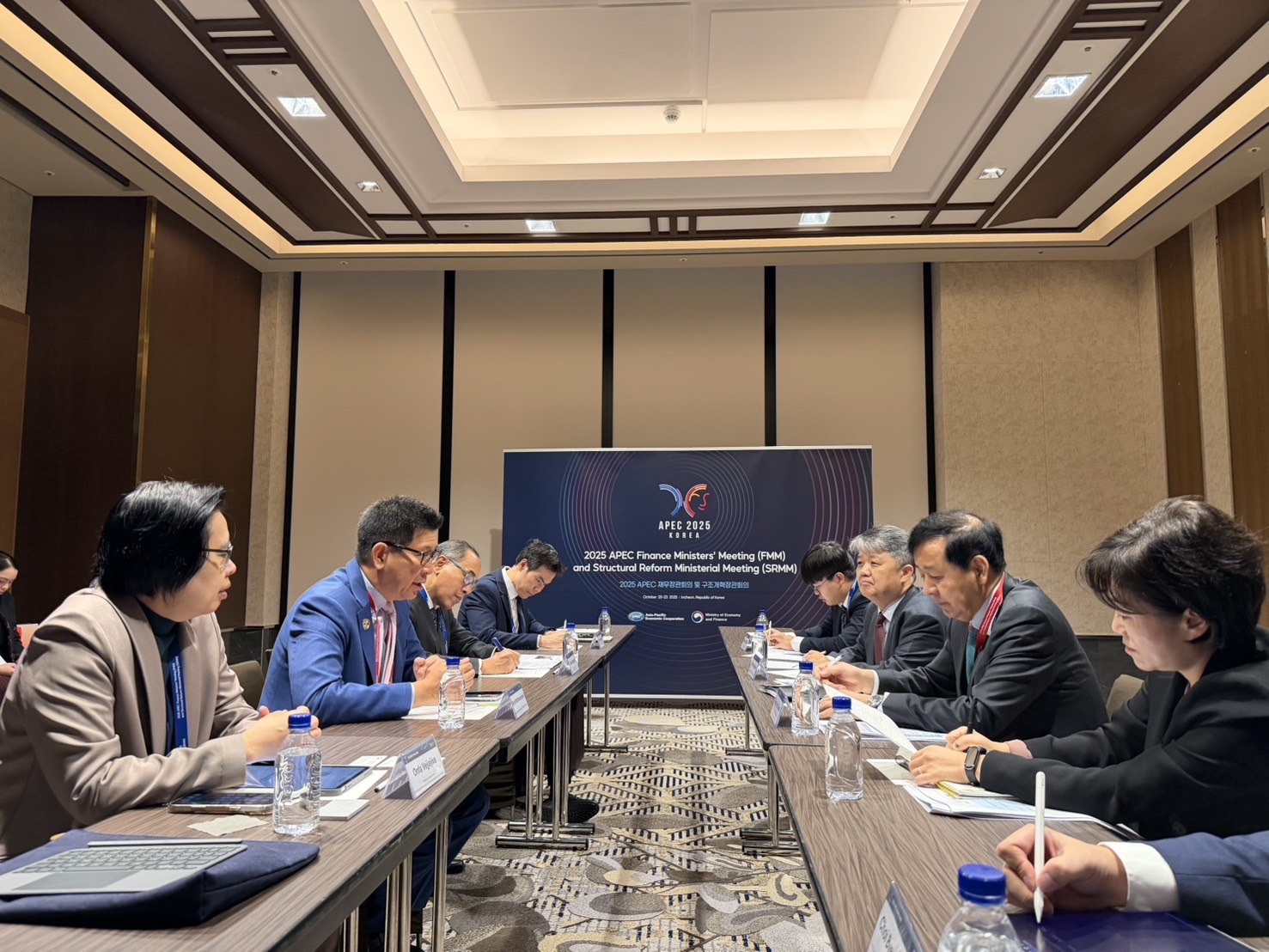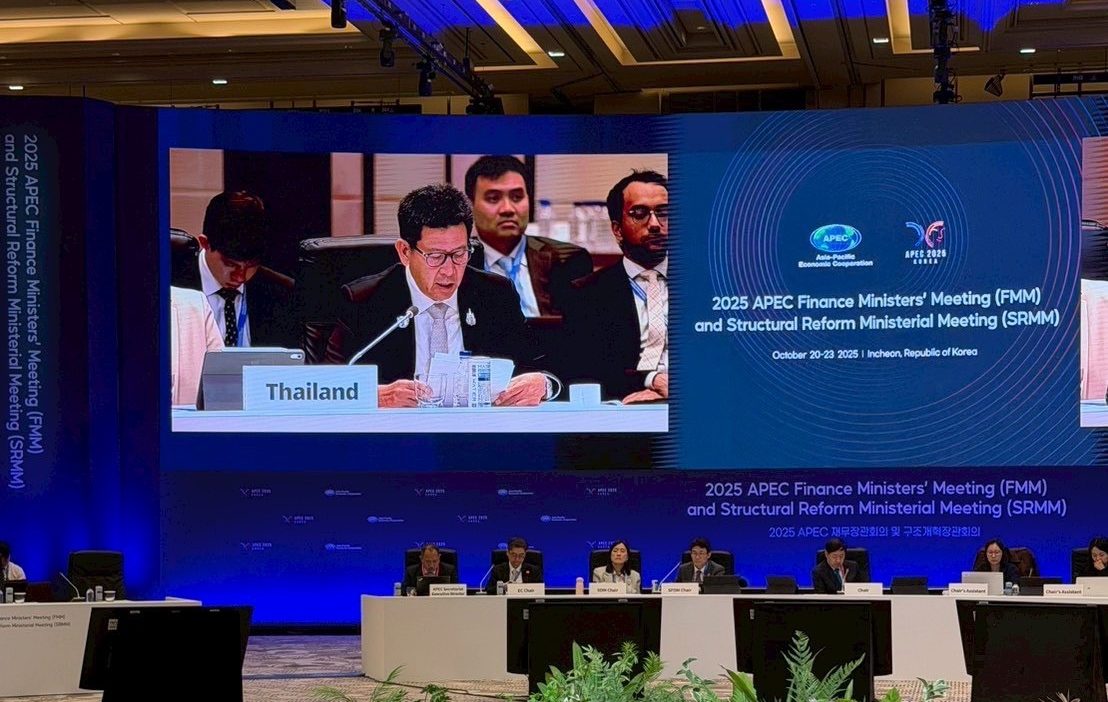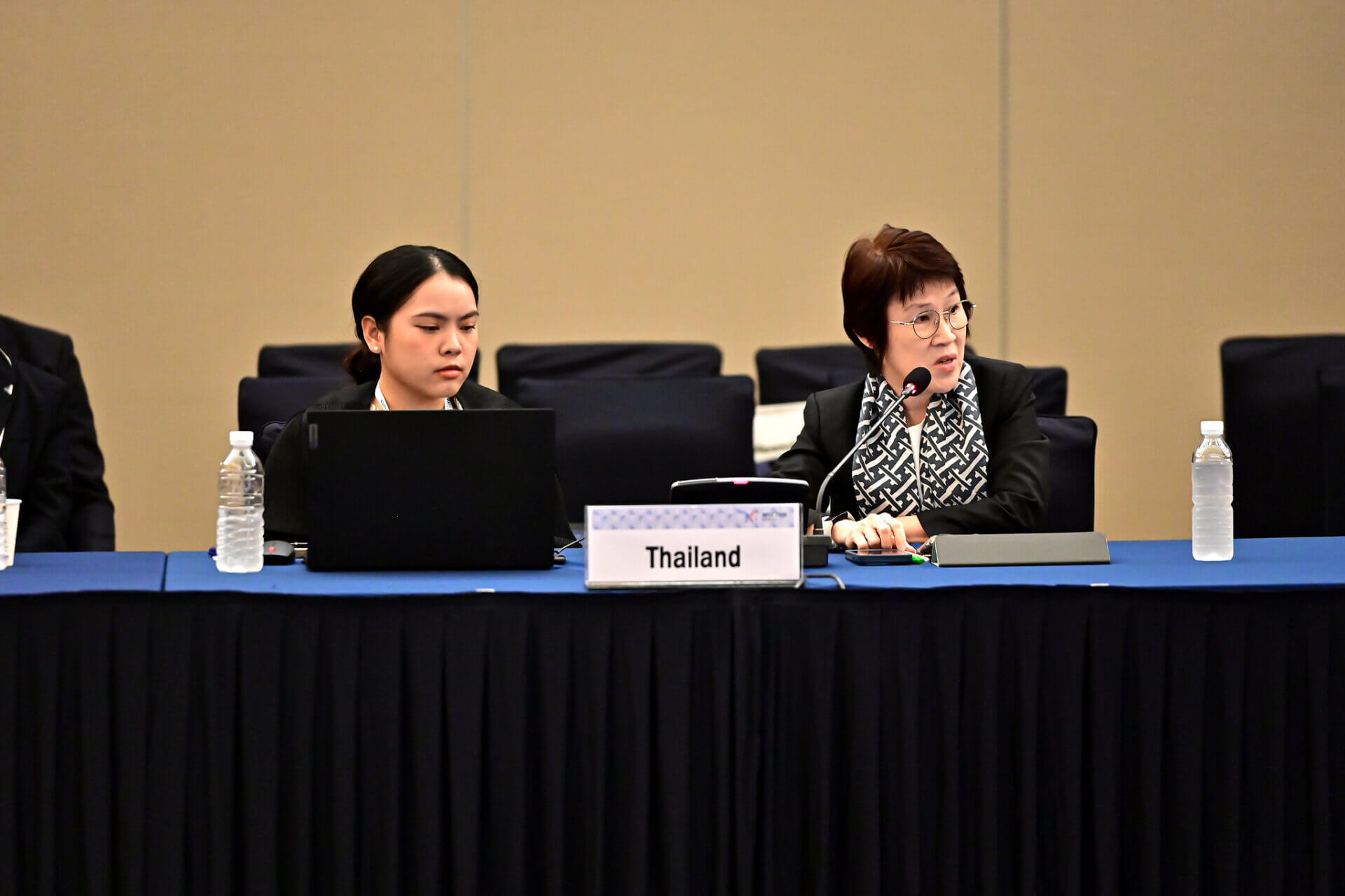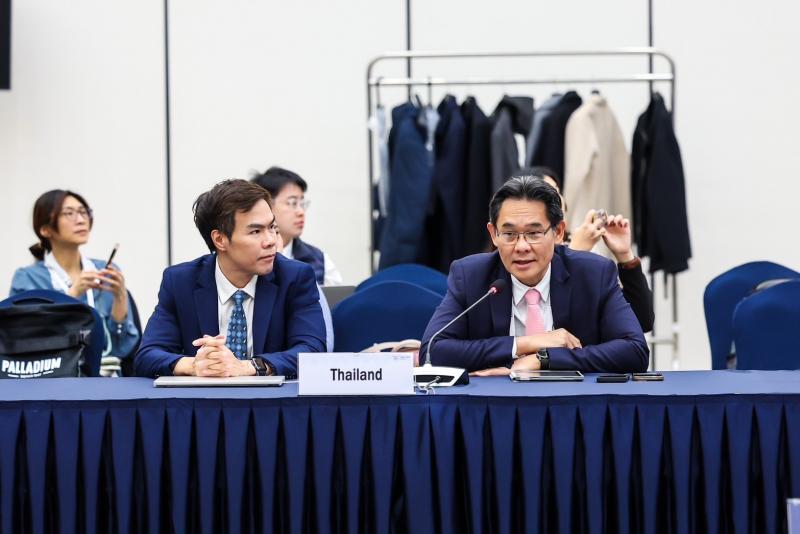Economic Cooperation in Asia-Pacific
United Nations (UN)
Important News and Updates
Joint Meeting of APEC Finance Ministers and APEC Structural Reform Ministers (FMM & SRMM) in Incheon, Republic of Korea
The Republic of Korea, as the host of APEC 2025, organized the Joint Meeting of APEC Finance Ministers and APEC Structural Reform Ministers on October 22, 2025, in Incheon, Republic of Korea. Mr. Ekniti Nitithanprapas, Deputy Prime Minister and Minister of Finance, led the Thai delegation to the meeting, accompanied by Ms. Onfah Vejjajiva, Secretary-General […]
The 4th APEC Structural Reform Ministerial Meeting in Incheon, Republic of Korea
On October 22-23, 2025, the Republic of Korea, as the APEC host for 2025, hosted the 4th APEC Structural Reform Ministerial Meeting (SRMM) in Incheon. Mr. Ekniti Nitithanprapas, Deputy Prime Minister and Minister of Finance, led the Thai delegation, accompanied by Ms. Onfah Vejjajiva, Secretary-General of the National Economic and Social Development Council, in her […]
Bilateral Discussion between Deputy Prime Ministers and Ministers of Finance of Thailand and South Korea
On October 23, 2025, Dr. Ekniti Nitithanprapas, Deputy Prime Minister and Minister of Finance, held bilateral talks with Mr. Koo Yun-cheol, Deputy Prime Minister and Minister of Finance of the Republic of Korea in Incheon, Republic of Korea. The meeting was attended by Ms. Onfah Vejjajiva, Secretary-General of the National Economic and Social Development Council, […]
Joint Meeting of APEC Finance Ministers and APEC Structural Reform Ministers (FMM & SRMM) in Incheon, Republic of Korea
The Republic of Korea, as the APEC host for 2025, organized the Joint Meeting of APEC Finance Ministers and APEC Structural Reform Ministers on October 22, 2025, in Incheon, Republic of Korea. Mr. Ekniti Nitithanprapas, Deputy Prime Minister and Minister of Finance, led the Thai delegation, accompanied by Ms. Onfah Vejjajiva, Secretary-General of the National […]
NESDC Participates in the 2nd APEC Economic Committee Meeting of 2025 to discuss the agenda for a strengthened APEC structural reform and issues of enhancing participation in the formal economy
On August 12-13, 2025, the Republic of Korea, as the APEC 2025 host, organized the 2nd APEC Economic Committee (EC) Meeting of 2025 during the Third Senior Officials’ Meeting and Related Meetings (SOM3) in Incheon, Republic of Korea. Ms. Sasithorn Palatthadech, Deputy Secretary-General of the National Economic and Social Development Council, led the Thai delegation […]
The 1st APEC Economic Committee Meeting of 2025 in Gyeongju, Republic of Korea
On March 3-4, 2025, the Republic of Korea, as the APEC 2025 host, organized the 1st APEC Economic Committee (EC) Meeting of 2025 during the First Senior Officials’ Meeting (SOM1) in Gyeongju, Republic of Korea. Mr. Danucha Pichayanan, Secretary-General of the National Economic and Social Development Council, led the Thai delegation in attending the Economic […]
APEC Economic Report 2024: Structural Reform and Financial Inclusion
The APEC Economic Policy Report 2024 (AEPR 2024) on Structural Reform and Financial Inclusion aims to promote structural reforms that support financial inclusion, which is a crucial component of sustainable, resilient, and inclusive economic growth. The report presents both demand-side and supply-side issues in financial access, focusing on implementing structural reforms to facilitate equitable access […]
The 2nd APEC Economic Committee Meeting of 2024 in Lima, Republic of Peru
On August 21-22, 2024, the Republic of Peru, as the host of APEC 2024, organized the 2nd APEC Economic Committee (EC) Meeting of 2024, which was part of the Third Senior Officials’ Meeting (SOM3) held from August 12-25, 2024, in Lima, Republic of Peru. Mr. Thatchai Keerapong Paiboon, Director of the International Strategy and Cooperation […]
APEC Economic Committee Meeting 1/2024 in Lima, Republic of Peru
On March 4-5, 2024, the Republic of Peru, as the APEC 2024 host, organized the APEC Economic Committee (EC) Meeting 1/2024, which was part of the First Senior Officials’ Meeting (SOM1) held from February 29 to March 8, 2024, in Lima, Republic of Peru. Mr. Thatchai Keerapongpaiboon, Director of the International Strategy and Cooperation Division, […]


General Information about UN Programs
The Greater Mekong Subregion Economic Cooperation (GMS) program is a cooperation framework among 6 countries in the Mekong River basin, including Cambodia, Lao PDR, China (Yunnan Province and Guangxi Zhuang Autonomous Region), Myanmar, Thailand, and Vietnam. It was initiated in 1992 through the efforts of these 6 countries and support from the Asian Development Bank (ADB) to promote economic, social, and environmental cooperation based on the comparative advantages of each country. Currently, the GMS program operates under the GMS Economic Cooperation Program Strategic Framework 2030, which aims to develop an integrated, prosperous, sustainable, and inclusive Greater Mekong Subregion.
The 3 pillars of cooperation under the GMS program Throughout its operation, the GMS program has been based on 3 pillars of development, or the 3Cs principle, consisting of:
Connectivity
Enhancing cross-border transport and energy connectivity through the development of physical infrastructure and regulatory frameworks.
Competitiveness
Strengthening competitiveness by promoting a fair and open regional business environment, focusing on trade, investment, tourism, agriculture, and urban development.
Community
Building a community with a shared future by promoting cross-border cooperation in public health and the environment, as well as improving the well-being of the people.
The GMS program emphasizes the concept of Economic Corridors, which connects cross-border economic areas through infrastructure, policy coordination, and unified regulatory development to promote economic activities and the movement of goods, services, people, and capital in the Greater Mekong Subregion. There are 3 main economic corridors:
(1) North-South Economic Corridor (NSEC) (blue) – A main route connecting southern China and Lao PDR to the sea, with 3 sub-corridors:
- Kunming (China) – Boten (Laos) / Tachilek (Myanmar) – Chiang Rai (Thailand) – Bangkok (Thailand)
- Kunming (China) – Hanoi (Vietnam) – Haiphong (Vietnam)
- Nanning (China) – Hanoi (Vietnam)
(2) East-West Economic Corridor (EWEC) (green) – A route connecting major economic cities between Vietnam, Lao PDR, Thailand, and Myanmar, spanning 1,500 kilometers, including Mawlamyine (Myanmar) – Myawaddy (Myanmar) – Mae Sot (Thailand) – Phitsanulok (Thailand) – Khon Kaen (Thailand) – Kalasin (Thailand) – Mukdahan (Thailand) – Savannakhet (Laos) – Dong Ha (Vietnam) – Da Nang (Vietnam)
(3) Southern Economic Corridor (SEC) (red) – A route connecting major economic cities between Thailand, Cambodia, Vietnam, as well as Myanmar and Vietnam – Cambodia and Laos, with 4 sub-corridors:
- Bangkok (Thailand) – Phnom Penh (Cambodia) – Ho Chi Minh City (Vietnam) – Vung Tau (Vietnam)
- Bangkok (Thailand) – Siem Reap (Cambodia) – Stung Treng (Cambodia) – Ratanakiri (Cambodia) – O Ya Dav (Cambodia) – Pleiku (Vietnam) – Quy Nhon (Vietnam)
- Bangkok (Thailand) – Trat (Thailand) – Koh Kong (Cambodia) – Ratanakiri (Cambodia) – Kampot (Cambodia) – Ha Tien (Vietnam) – Ca Mau (Vietnam) – Nam Can (Vietnam)
- Sihanoukville (Cambodia) – Phnom Penh (Cambodia) – Kratie (Cambodia) – Stung Treng (Cambodia) – Dong Kralor (Laos) – Pakse (Laos) – Savannakhet (Laos), which intersects with the East-West Economic Corridor

Economic Corridors
Focus on developing high-potential economic areas (Economic Corridors)

A framework for investment in near-term projects aligned with GMS development objectives. Currently operating under RIF 2025, covering the period 2023-2025, comprising 111 projects across all 6 countries.

